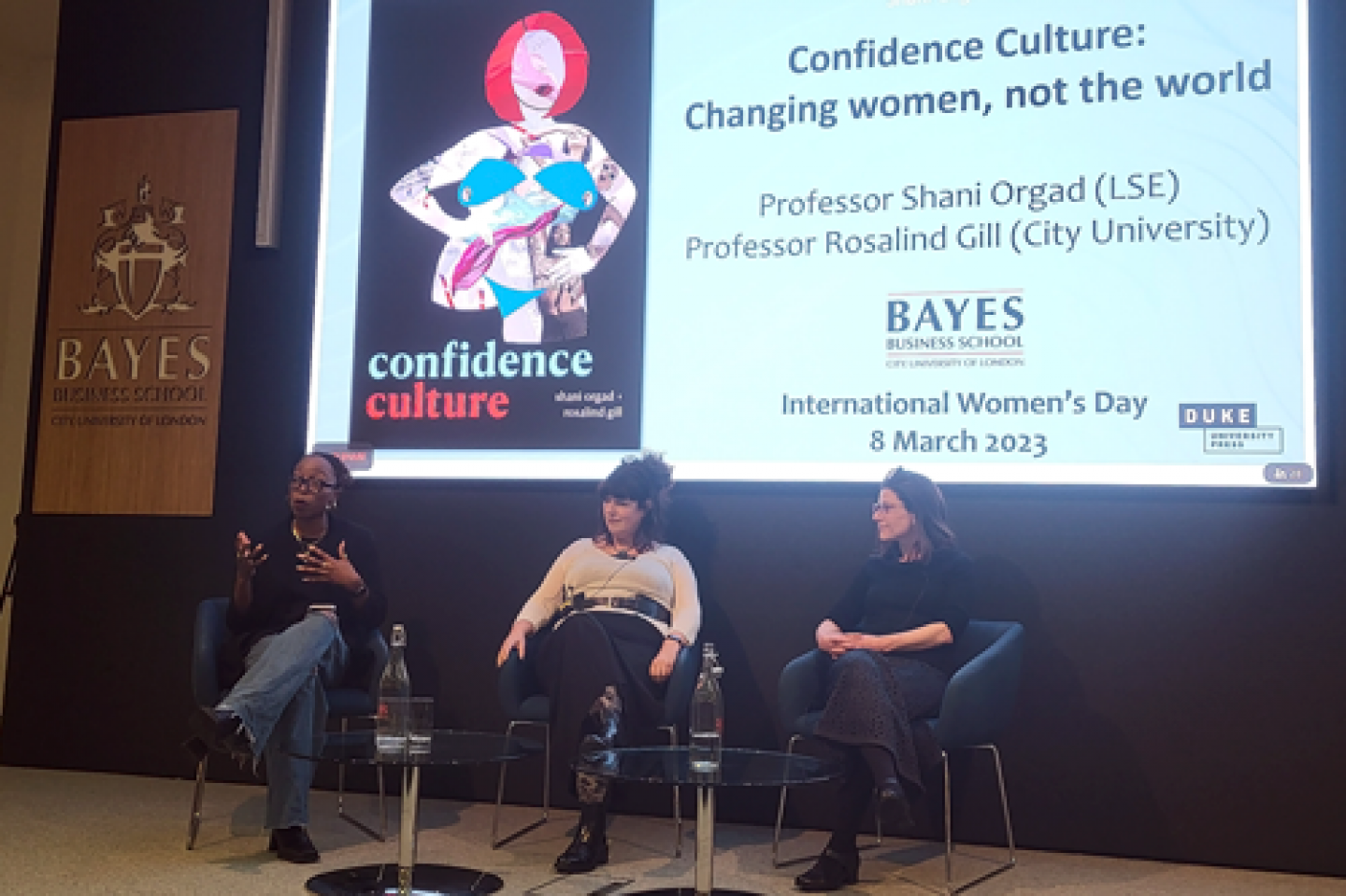City’s Professor Rosalind Gill and LSE’s Professor Shani Orgad deliver International Women’s Day lecture on ‘confidence culture’.
By Eve Lacroix (Senior Communications Officer), Published (Updated )
Confidence is a cult, argue Professor Rosalind Gill and Professor Shani Orgad in their book Confidence Culture.
Speaking at an event marking International Women’s Day hosted at Bayes Business School (formerly Cass), the two researchers discussed the ways in which ‘confidence culture’ impacts women at work and their self-perceptions.
Ros is a Professor of Cultural and Social Analysis and the Co-Director of the Gender and Sexualities Research Centre at City, University of London. Her co-author Shani is a Professor of Media and Communications at the London School of Economics and Political Science (LSE).

They define ‘confidence culture’ as the process by which society demands women look inwards to find confidence in themselves, all the while ignoring the systemic structures in place that strip women of their confidence.
These pressures towards women come from all angles: advertisements selling beauty products to boost women’s body image, Twitter threads that ask women to stop saying ‘sorry’ in conversations to appear more assertive, workplace training programmes teaching women how to be more confident.
Ros and Shani argue that this messaging places the onus on women to improve their self-confidence instead of looking at structural issues such as classism, sexism and racism.
Confidence Culture was published a year ago, and since then, the UK has seen a deepening of social inequalities due to the war in Ukraine, the cost-of-living crisis and the energy crisis.
“What’s really striking is that we’re seeing a lot of self-blame from women in what is an increasingly hostile environment,” said Ros. “Women are struggling and working intensely, and yet they are still being asked to take on more through ‘self confidence’ type training programmes in the workplace.”
In light of these structural inequalities worsening, Shani wished the audience “an angry International Women’s Day.”
The event hosted by the Global Women’s Leadership Programme (GWLP), a programme which seeks to inspire, equip and connect women leaders. The programme hosts skills workshops and thought leadership events on the topic of women’s leadership and coordinates scholarships to support female students at Bayes Business School.
GWLP Programme Director Dr Janina Steinmetz said Ros and Shani’s research embodied the spirit of the GWLP, which questions the systemic issues that impair women’s ability to progress in the workplace.
“Society often tells women to fix themselves and to work on themselves, but we have to recognise that the playing field is not always level when there are so many policies that are inherently sexist,” Janina said.
Women’s health is one such area in which workplace policies lag behind, and the GWLP’s upcoming event will address this, covering the topic ‘Women’s health: how fertility, menstruation and menopause affect women’s career decisions’ on Wednesday 26 April.
The event was moderated by Clarice Metzger, a Full-time MBA alumna and GWLP alumna, who is the Founder of the Yard Club, a membership club, and the talk was followed by audience questions and a networking evening.

Audience member Nilanthi Sangarabalan, Senior Operations Director at the digital marketing agency Jellyfish, described the event as “eye-opening”. An alumna of the Executive MBA at Bayes, she recognised herself in the demographic of women who were targeted by ‘confidence culture’, consuming self-help books and working on their confidence.
“What was brought to light today is that there are a lot more systemic issues,” said Nilanthi. “I’m part of the committee of an employee resource group for women in my company in which we collaborate closely with HR to bring about changes in policy and processes to support women in the workplace. Tonight’s event justified the work we’re doing and will help direct our efforts.”



